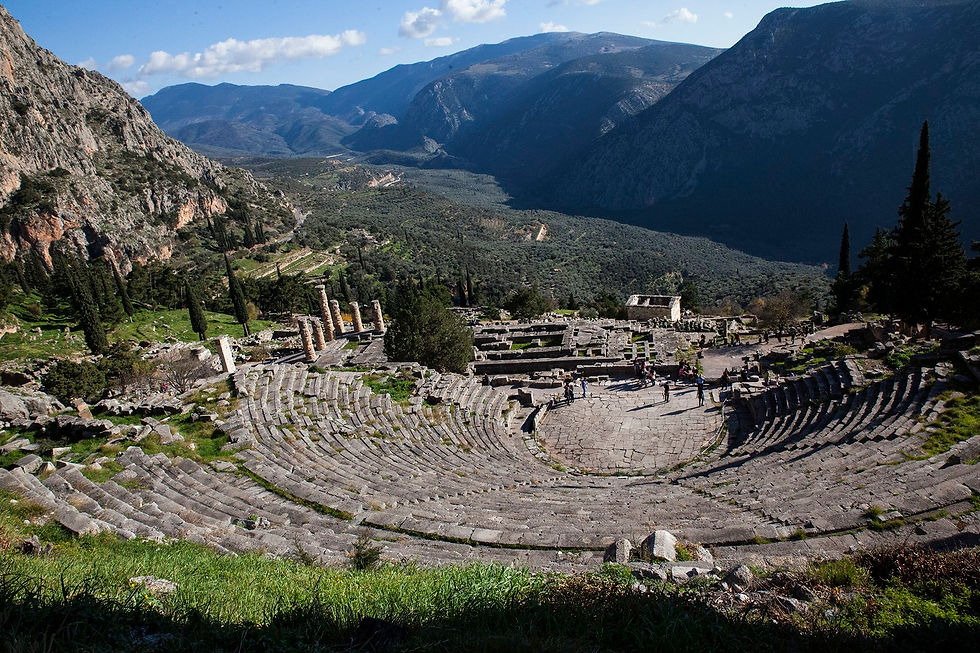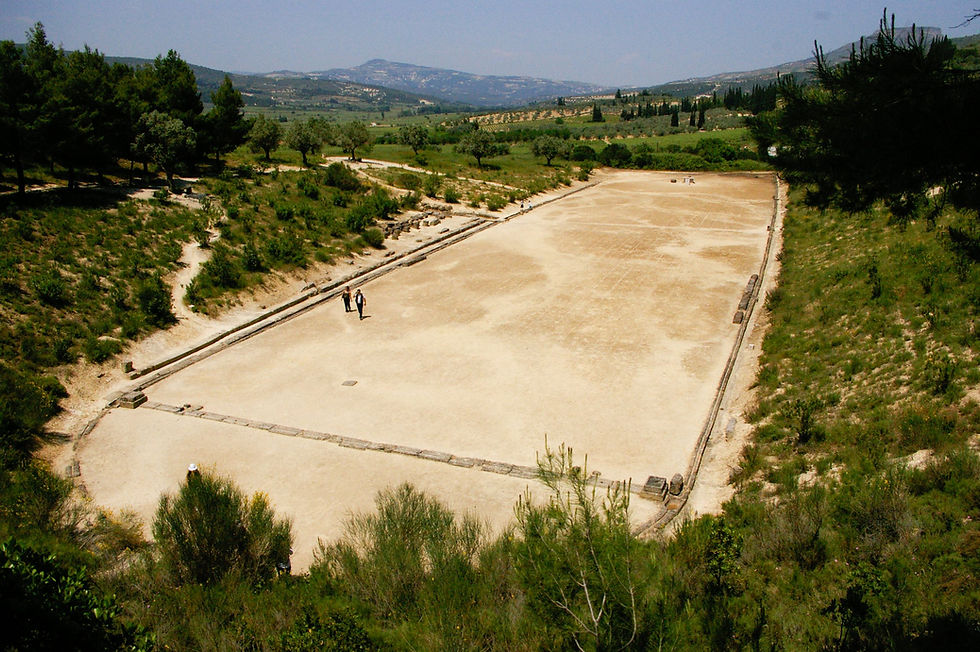The Panhellenic Games
- Hellenic Museum
- Jul 1, 2021
- 4 min read
Updated: Aug 25, 2021

(Metropolitan Museum of Art, New York) © Games and Sanctuaries in Ancient Greece/Kapon Editions Courtesy
The Olympic Games have become a large and popular event in the modern world, with a global audience numbering in the billions in recent years. It’s relatively easy to forget the ancient origins that inspired the modern Games or to assume that they were identical to the one we know today.
In ancient Greece, there were four recurring competitive sporting events, or festivals, that were known as the ‘Panhellenic Games’. These four games would occur within a four year cycle known as an ‘Olympiad’: in the first year would be the Olympics, in the second the Nemean and Isthmian Games, then the Pythian in the third, followed by the Nemean and Isthmian again before the next Olympics.
The Panhellenic Games were not just public events, but were an integral way of maintaining and asserting Greek identity. In a time when ‘Greece’ did not exist as we understand it (that is, a unified state), the various city-states, who shared a religion, language and culture, reinforced this shared identity by competing against one another (ritually, we might say). All four of the games were restricted to Greeks: non-Greeks (and women) could neither spectate nor participate.
The aim of the games was to not only achieve personal prestige, but to honour the relevant god; the games took place in their respective sanctuaries and animals were sacrificed before the games began. Unlike today’s games, athletes competed for their own glory before their city-state and only the winner received a prize - a wreath (there weren’t any silver or bronze medals here!).
The Panhellenic Games continued for centuries, up until the 4th century CE, before they were abolished as pagan festivals by Roman Christian Emperor Theodosius.
OLYMPIC GAMES
The ancient Olympics are the most famous and prestigious of the Panhellenic Games, and were the inspiration for their modern inception.
The first recorded instance of the Olympics was in 776 BCE in Archaic Greece. The ancient Olympics, unlike their modern counterpart, were a sacred event that was held in honour and glory of Zeus, although victors gained their own prestige. The month prior to the event, the ekecheiria, was a time of truce throughout Greece; messengers were sent out to announce it and anyone wishing to take part or watch the Games was able to safely travel to do so.
The event would take place in Olympia, a sanctuary site that held a Temple of Zeus, a Temple of Hera, a stadium, treasuries, and a range of other structures. Men would compete in the nude across a range of events, including running, wrestling, boxing and chariot races. Only men could compete; the only way that women could get around this rule was if they owned a chariot used for the racing.
The marathon was not an event in ancient Greece and was only introduced with the first modern Olympic Games in 1896.
Winners at the ancient Olympics received an olive wreath and were glorified in poems, and sometimes statues in their home city.
Plan of the sanctuary of Olympia, Greece, from N. Kaltsas, Olympia, Athens, 2004 (3rd ed.), fig. 14, p. 16–17. The site of Olympia today from © Discover Greece.
PYTHIAN GAMES
The Pythian Games were held two years before each ancient Olympics, and took place in Delphi, in honour of Apollo who was said to have killed the Python, a mythical serpent.
The Pythian Games began in the 6th century BCE and were organised by the Delphic Amphictyony, a league or council of twelve nearby states. They initially began as a single contest of singing a hymn to Apollo, which occurred every eight years, but when the Amphictyony took control, they added more musical, artistic, dance and athletic events, and scheduled it to every four years.
The Games would last for approximately a week. The athletic events resembled those at the Olympics and would take place in the stadium, while the creative competitions were held in the theatre of Delphi. Winners would receive a laurel wreath, the sacred plant of Apollo.
It was second in importance next to the ancient Olympics and, much like it, a sacred peace was observed, with safe passage for all involved - anyone who broke it was barred from the sanctuary.

NEMEAN GAMES
The Nemean Games took place in Nemea, in the Peloponnese and were scheduled one year before and one after the ancient Olympics. Also in honour of Zeus, they first began as a series of equestrian and athletic events that only warriors or soldiers could attend; from about 573 BCE onward, the Games were opened to all Greeks and further events were added.
According to myth, Herakles, after defeating the Nemean Lion as part of his twelve labours, founded the Nemean Games. Another myth places them as early funeral games begun by the Seven Against Thebes after Opheltes, a young child, was killed by a snake while his mother helped them; they then killed the serpent in retaliation.
Winners would receive a wreath made of wild celery from the city of Argos.

ISTHMIAN GAMES
The Isthmian Games were named after the isthmus of Corinth, a small land bridge connecting the Peloponnese to mainland Greece.
Starting in the 6th century BCE, these Games were held every two years and coincided with the Nemean Games. Corinth organised the Games until the Romans destroyed the city in 146 BCE. They were held in honour of Poseidon and featured both athletic and musical competitions. Horse and chariot racing were very popular because the horse was one of Poseidon’s sacred animals.
According to Pausanias and Pseudo-Apollodorus, the Isthmian Games also began as funeral games, this time for Melicartes (a Boeotian prince), which were initiated by Sisyphus, the legendary founder of Corinth (yes, the same one pushing the boulder up the hill) who discovered Melicartes' body and buried it at the site. Plutarch claimed that Theseus expanded them into the athletic games we understand today.
Victors won wreaths of wild celery and then pine in Roman times, while Athenian victors would also receive 100 drachma from the Athenian treasury. As with the other Games, a sanctuary (Poseidon’s in this case) sat on the site and statues of the victors lined the path to it. How's that for an entrance?






Commentaires